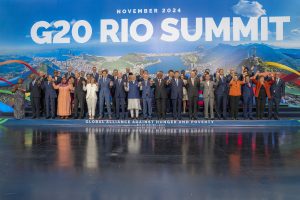At the 19th G-20 Summit at Rio in Brazil last week, India’s Prime Minister Narendra Modi flagged the hardships of the less developed economies of the world. While the G-20 groups together key developed and emerging economies, India has been voicing the problems faced by countries in the Global South at its summits and forums.
“Countries of the Global South are most adversely impacted by the food, fuel and fertilizer crisis caused by global conflicts,” Modi said at the G-20 Session on ‘Social Inclusion and the Fight Against Hunger and Poverty.’
“So our discussions can only be successful when we keep in mind the challenges and priorities of the Global South,” he said.
“And just as we amplified the voice of the Global South by granting permanent membership of G-20 to the African Union during the New Delhi Summit [in 2023], we will reform institutions of global governance,” Modi said.
Again, speaking at a session on Sustainable Development and Energy Transition, Modi underlined that “economic development is a priority for countries of the Global South, and in particular for Small Island Developing States. In the digital age, and given the growing influence of AI, the need for a balanced and appropriate energy mix becomes all the more important.”
“Therefore affordable and assured climate finance for energy transition in the Global South, has become even more important. It is also essential for developed countries to fulfill their commitments to provide technology and finance, in a timely manner,” he said.
India also signed onto the “Global Alliance Against Hunger and Poverty” launched at the Rio G-20 Leaders’ Summit that brings together 148 founding members, including 82 countries, the African Union, the European Union, 24 international organizations, 9 international financial institutions and 31 philanthropic and non-governmental organizations. The initiative aims to fast-track global efforts toward eradicating hunger and poverty which are key priorities under the SDGs.
Against the backdrop of uncertain recovery following the COVID-19 pandemic, the challenges posed by the onset of climate-induced crises and conflicts like the Russia-Ukraine War and Israel’s invasion of Gaza, the theme of the Rio G-20 summit was “Building a Just World and a Sustainable Planet.”
According to India’s G-20 Sherpa Amitabh Kant, the Rio de Janeiro G-20 Declaration draws on and carries forward many of the goals set out in the 2023 New Delhi G-20 Declaration. These include lifestyle changes to protect the environment, the emphasis on accelerating the Sustainable Development Goals (SDGs), the acknowledgment of the role played by digital public infrastructure in bringing changes to the lives of people and the importance of women-led development.
India’s voicing of concerns, apprehensions and aspirations of the Global South at the Rio G-20, follows two summits it organized with Global South leaders in January and November 2023. The main aim was to include and incorporate views and voices of those not represented at the G-20 table. The inclusion of the African Union as a G-20 member at the New Delhi Summit was among the major outcomes of the Indian presidency.
Besides the two Global South leaders’ summits last year, this year too India gathered the countries of the Global South for a brainstorming session in August. The aim was to “discuss ideas and solutions from the Global South on various developmental priorities, including those relating to development finance, health, climate change, technology, governance, energy, trade, youth empowerment, digital transformation, women-led development, capacity building, and human-centric sustainable development,” ahead of the Rio meet, an Indian foreign ministry statement said.
India has been raising Global South issues for many years. This burnishes its credentials to be seen as a credible power in a multipolar world with the capacities and willingness to play a larger role in global affairs.
During the COVID-19 pandemic, India sent vaccines under an initiative codenamed “Vaccine Maitri” to over 100 countries, a majority of them from the Global South.

































